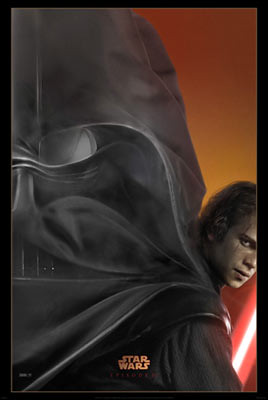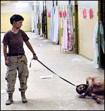
This past weekend I was in a Seattle airport bookstore when I saw the novelization for the upcoming Star Wars prequel, Revenge of the Sith and I couldn't resist buying it. I just finished reading it a few hours ago. Of course there really weren't any real surprises. We all know how the story ends. The book is all about transition. Completing the circle. The Republic falls and turns into an Empire. The only real question is how does it all come to pass. How do the honored and respected Jedis become hunted renegades? How does Senator Palpatine become Galactic Emperor? How does Anakin the small fun-loving child become Darth Vader, lord of the Sith?
Although this really isn't intended as a movie/book review, I'll say that they do a decent (but not a great) job of tracing Anakin's fall to the darkside. For my tastes the path was a little too quick to be totally believable or compelling but they could have done worse.
For some reason, this issue of transition from "good" to "evil" is a very fascinating one. As a friend of mine puts it "Even Osama had a mama". If there is no original sin and we are all basically well-intentioned then where does violence and evil come from? This is a question which seems to have been very prominent in our times, both fictional and factual. In her diary, Anne Frank famously said "I still believe, in spite of everything, that people are truly good at heart". But do we believe that? In some ways she has a point. For example, in families one can often find situations where individuals love one another very much but still end up hurting one another somehow. Maybe the road to hell really is paved with good intentions.
And if we don't want to believe Anne Frank, and want to divide the world into heroes and villans, then where is the line? In the wake of Abu Ghraib, Bush declared that he is frustrated by anti-American sentiment abroad because "I know how good we are". What does that mean anymore?

People don't turn evil overnight. It's more like the famous analogy about boiling a frog. You can't just throw a frog into a pot of boiling water, it will just jump out right away. What you do is you put the frog in the pot of cold water, and put the pot on the stove. That way, you boil the frog and you don't even need to put a lid on the pot. Imperceptibly, the temperature rises until you find yourself slowly cooking in the melting pot, and you can't get out.
In certain respects, the Revenge of the Sith was more of a modern fable than a fairy tale. Palpatine's justifications for Empire seemed a little too familiar to our ears. But the important question is whether *we* would be able to tell when our own Republic crosses the line into Empire?
No comments:
Post a Comment